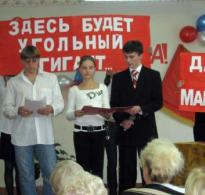Its consequences for Russia. Tilsit world. Its consequences for Russia Prerequisites for the emergence of an agreement
The Peace of Tilsit is a treaty signed between the Russian Empire and France in 1807.
The terms of the Peace of Tilsit were worked out during negotiations between the Russian Emperor Alexander I and the ruler of France, Napoleon. What preceded the signing of the Treaty of Tilsit?
A year earlier, in Europe, dissatisfied with the French Republic, the states formed another anti-French coalition. The coalition included such European countries as Prussia, England, Sweden and the Russian Empire.
Almost immediately after the outbreak of hostilities, in October 1806, the French defeated Prussia and took Berlin. Napoleon saw the defeat of England as his main task in the new campaign.
It was extremely difficult to defeat England by force. Therefore, taking into account the geographical and economic features, Napoleon issues a decree on the "Continental blockade".
The French understood that the Russian Empire was one of the most powerful European states, and therefore it was simply impossible to ensure a trade blockade of England without the participation of the Russians.
Ahead were six months of fierce fighting in Europe. In December 1806, the French army managed to win at Friedland. The victory in this battle allowed them to approach the border of the Russian state.
Alexander I at that moment was not to be envied. Military operations promised to go to the territory of Russia. The war could become protracted. Fighting alone in Europe has always been very difficult. After all, Napoleon was able to defeat all Russian allies on the continent, and England did not provide any significant support to the Russian Empire.
In the current situation, the Russian emperor decided to turn Russia's foreign policy 360 degrees. Prince Lobanov-Rostovsky was sent to Napoleon, who was instructed to propose a truce to the French. Napoleon was extremely pleased with this turn of events, he cordially received the envoy. As a result, Lobanov-Rostovsky and French Marshal Berthier signed a truce.
After the conclusion of the truce, Napoleon expressed a desire to meet with the Russian emperor. Alexander I was not opposed. The meeting of two very influential people of their era took place on July 25, 1807. It was on a raft on the Neman River. Alexander I declared his readiness to take part in actions against England.
Napoleon was delighted with this turn of events, and declared that there would be peace between Russia and France. Then the national leaders moved on to discussing the details of the Tilsit peace treaty.
Negotiations continued for a long time, and were not at all easy. The fate of all of Europe was in the hands of Alexander I and Napoleon, and they could dispose of it as they pleased. Napoleon was a skilled diplomat, and played an interesting combination.
To the Russian emperor, the Frenchman offered to divide Turkey, and not prevent Wallachia and Moldavia from joining the Russian Empire. Further, Napoleon proposed to annex the lands from the Neman to the Vistula to Russia. The purpose of the last sentence is to spoil Russian and Prussian relations.
The Russian monarch refused this offer, and convinced Napoleon that Prussia could not be destroyed. However, the world for Prussia was still humiliating, large territories were ceded to France, and the agreement contained the wording - "Only out of respect for the Russian emperor."
At the borders of the Russian Empire, a new state appeared - the Duchy of Warsaw, which was the heir to the once mighty Poland. However, Napoleon said that a strong Poland, threatening the interests of Russia, did not interest him.
And so, the following points became the main conditions of the Tilsit peace:
- The Russian Empire recognized all the military conquests of France.
- The Russian state joined the continental blockade of England.
- The Russian Empire and France pledged to help each other in any offensive or defensive war.
- On the lands of the Prussian possessions of former Poland, a new state was formed - the Duchy of Warsaw, dependent on France.
- Russian troops left, conquered from the Turks, Wallachia and Moldova.
- Recognition of the Russian Empire of the Confederation of the Rhine.
- The Russian Empire did not prevent Napoleon from annexing the Ionian Islands to France.
Having signed the Treaty of Tilsit, Alexander I found himself in an awkward position, abandoning his old allies. However, history cannot be deceived, and the war of 1812 is proof of this.
It is worth noting that after the signing of the Treaty of Tilsit, Napoleon began to feel much more confident, comfortable and even bolder in Europe. It cannot be said that French diplomacy in no way helped Russia in observing its interests in Turkey.
This was not the only point of the Peace of Tilsit not carried out by France. The rupture of the two states was inevitable, their interests and ideas about the future of the world and Europe were too different.
De jure, the Peace of Tilsit existed until the beginning of the Patriotic War of 1812. De facto, the Tilsit peace was violated by the French much earlier.
The epic novel "War and Peace" is full of a large number of small but important episodes that do not directly affect the development of the plot and do not play a decisive role in the fate of the main characters. These episodes are of particular importance for understanding the novel as a work that combines ideas about the personality of a person, his role in history and the universe as a whole.
The conclusion of the peace treaty in Tilsit is such an episode. In this episode, important ideological lines intersect, the motives of war, honesty, and justice are touched upon. The author allows us to see new details in the descriptions of two emperors - Alexander and Napoleon.
The Peace of Tilsit is the most important event in the development of international politics at the beginning of the 19th century, and the meeting of the great emperors itself became epoch-making. We present an atmosphere of solemnity and majesty.
Our experts can check your essay according to the USE criteria
Site experts Kritika24.ru
Teachers of leading schools and current experts of the Ministry of Education of the Russian Federation.
But Tolstoy, in his characteristic manner, depicts everything without a majestic halo, truthfully and simply.
The author depicts the conclusion of the peace treaty of Tilsit through the perception of Nikolai Rostov, who arrived in order to deliver Denisov's petition for pardon to the emperor. Rostov travels at night, he does not want to be recognized, so he is wearing a civilian dress, he feels awkward and embarrassed, which increase even more when he sees everything that is happening. At first, he was perplexed to discover the French in Boris's apartment, and yet in the army they were still treated with contempt, hatred, and even some fear. At the same time, Tolstoy does not support either Boris or Nikolai. The first quietly dine with former enemies, the second hates them fiercely, although, in fact, they are no longer enemies.
In this episode, the author makes us understand that excessive patriotism is not always justified. Yes, it is natural during the war, but one must be able to communicate with people outside of hostilities. However, this idea is not absolute, because the writer tells us about how Boris, Tolstoy's unloved hero, is easily in the same company with the French.
In this episode, images and their placement are of great importance. We see the opposition of the images of Rostov and Boris. Rostov asks for Denisov, as Boris had previously asked for himself from Prince Andrei. But now the roles have changed. Boris listens to Nikolai from above, as if he is a subordinate and reports on the events to his general. Rostov feels awkward, because before they communicated quite friendly. Tolstoy puts Boris in this scene in an extremely unfavorable light.
In this episode, Nikolai Rostov is also disappointed in his ideals, his former convictions are crumbling. The hero represented the sovereign as an exceptional personality, fairer and more generous than whom there is no one. But the author shows us and his hero the true face of the emperor, and Nicholas gradually changes his mind about Alexander. The emperor turns out to be not at all such an impeccable monarch as he seemed to Nicholas and the people. Here the sovereign appears on the porch, and Nicholas is struck by his appearance, in which greatness and meekness are read at the same time. However, Tolstoy very quickly reduces this image: the emperor is a phrase-monger. For him, to say a phrase is almost to create a work of art. But this phrase has nothing to do with real life.
Nikolay admires the Russian emperor, and Boris admires Napoleon, who is shown in the novel as more vulnerable than Alexander. In turn, Rostov is stronger than Boris.
Tolstoy systematically debunks the image of Napoleon. The French emperor does not hold well in the saddle, his external characteristics are unattractive: an unpleasantly feigned smile on his lips, he is small in stature and has small white hands. Behind Napoleon stretches the long tail of the retinue.
It is unpleasant for Rostov to watch how Bonaparte easily and freely communicates with Alexander, and the Russian emperor responds favorably to him. Nicholas cannot understand how a lawful sovereign and a criminal can communicate peacefully.
Lazarev, who was recognized as the bravest in this war, receives an award. This seems unfair to Nikolai, because, in his opinion, Denisov may have been braver than Lazarev, and now he is serving a sentence. The whole scene of the conclusion of the Tilsit peace treaty is a contrast to the episodes of the war, as well as the previous chapters in the hospital, where we saw the whole truth of life and realized how unattractive it was. At the same time, we cannot say that a cardinal change is taking place in the soul of Nikolai Rostov. He sees what is happening, but does not try to evaluate it, to understand what he feels, he is afraid of his thoughts. And although he understands that the war with its cruelty, with the death of innocent people, torn off hands and crippled destinies, Napoleon with his white pen and Alexander smiling at Bonaparte somehow do not fit together. So a drunken cry breaks out of Rostov's soul - a cry of despair, which is caused by deep disappointment in what he sacredly believed in. But to believe that there is no sovereign, no God, he does not agree. So Tolstoy introduces the motive of doubt, thanks to which the moral growth of a person is possible.
So, the episode of the conclusion of the Peace of Tilsit plays a significant role in the novel, since it shows the other side of the world, which is not subject to the consciousness of truth, but is filled with undisguised life truth. In such a world, a sincere, honest person feels uncomfortable. The author sought to show the real life of people and the human way in this life.
At the beginning of the 90th century, events took place in Europe, as a result of which, in 1807, the Peace of Tilsit was concluded between Napoleon Bonaparte and the Russian Emperor Alexander I, which influenced the entire further course of history.
Having proclaimed himself French Emperor in 1804, Napoleon hatched ideas about the conquest of Europe. In contrast to his plans, a third coalition was created between Austria, Great Britain, Russia, the Kingdom of Naples, Portugal and Sweden. Near Austerlitz, the coalition troops were defeated, and Austria concluded an alliance treaty with Bonaparte. Russia, as part of the fourth coalition, which included Prussia and Great Britain, continued military operations against the Napoleonic troops. In the Battle of Friedland in the winter of 1807, the Russian army was defeated by the French and was forced to retreat. Napoleon achieved his goal and was able to impose on Emperor Alexander the shameful and unprofitable in all respects Tilsit peace.
Signing an agreement
The meeting of the two emperors took place in the town of Tilsit. Now it is the city of Sovetsk in the Kaliningrad region. On June 25, 1807, a raft was built for the meeting of the emperors, on which a face-to-face meeting took place, which had very serious, but, unfortunately, negative consequences for the Russian Empire. After that, several more meetings took place between the heads of powers, and Alexander even attended a review of the French troops. On July 7, 1807, the Treaty of Tilsit was signed. From that moment, the redrawing of the map of Europe began, which, by and large, was the beginning of the end of the reign of Napoleon Bonaparte.
Terms of the contract (assignment)
The Peace of Tilsit put the Russian Empire in a very disadvantageous position. According to this agreement, the emperor was forced to make the following concessions:
- join the blockade of his ally - Great Britain;
- recognize Napoleon for all his conquests;
- help France in the conduct of wars;
- withdraw troops from Moldova;
- recognize Napoleon's relatives as kings (of Neapolitan, Dutch and Westphalian);
- recognize education dependent on France
The Treaty of Tilsit in 1807 completely isolated Great Britain, which found itself in a continental blockade, and Napoleon no longer had any rivals to carry out his ambitious plans.
Terms of the contract (compensation)
It should be noted that, concluding the Treaty of Tilsit in 1807, Emperor Alexander I also achieved several concessions from Bonaparte. Russia got the Bialystok department as compensation. Danzig at this time becomes a free city, and a relative of Emperor Alexander, the Prussian king Friedrich Wilhelm III, gets back the old Prussia, Silesia and Pomerania.
Peace of Tilsit, consequences
The progressive strata of Russian society perceived the terms of this peace treaty as a slap in the face, and Napoleon was not called anything other than a usurper. It took another five years for the Russians to be able to honestly and openly look into each other's eyes. Only a year was able to provide this opportunity.
The peace of Tilsit, the consequences of which the Russian economy experienced firsthand, was, in fact, catastrophic. At the beginning of the 19th century, the Russian Empire supplied grain, hemp, timber and much more to the European market. Due to the blockade of Great Britain, which accounted for the lion's share of Russian exports, the economy of the Russian Empire suffered enormous damage. Merchants and landowners were seriously affected. England caused a decline in Russian trade by almost half, and its treasury significantly "lost weight". Prussia suffered the most from the Tilsit peace treaty. She lost half of her lands and paid indemnities to France until the end of the 19th century.
Peace of Tilsit- a peace treaty concluded between June 13 (25) and June 25 (July 7) in Tilsit (now the city of Sovetsk in the Kaliningrad region) between Alexander I and Napoleon after the War of the Fourth Coalition -1807, in which Russia helped Prussia.
Story
The main point of the Treaty of Tilsit was not published at that time: Russia and France pledged to help each other in any offensive and defensive war, where circumstances so required. This close alliance eliminated Napoleon's only strong rival on the Continent; England remained isolated; both powers pledged by all means to compel the rest of Europe to comply with the continental system. On July 7, 1807, the treaty was signed by both emperors. The Peace of Tilsit raised Napoleon to the pinnacle of power, and put Emperor Alexander in a difficult position. The feeling of resentment in the metropolitan circles was great. “Tilsit! .. (at the sound of this offensive / Now Ross will not turn pale),” wrote Alexander Pushkin 14 years later. Subsequently, they looked at the Patriotic War of 1812 precisely as an event that “smoothed out” the Peace of Tilsit. In general, the significance of the Peace of Tilsit was very great: from 1807, Napoleon began a much bolder reign in Europe than before.
Peace conditions
- Russia recognized all the conquests of Napoleon.
- Accession of Russia to the continental blockade against England (secret agreement). Russia must completely abandon trade with its main partner (in particular, the terms of the peace treaty ordered Russia to completely exclude the export of hemp to the UK) and, together with France, influence Austria, Denmark, Sweden and Portugal with the same goals.
- Russia and France pledged to help each other in every offensive and defensive war, wherever circumstances so require. So during the war with Sweden (1808-1809), with the support of France, Russia acquired Finland. At the same time, Russia did not actually provide assistance to France in its war with Austria in 1809, an auxiliary corps under the terms of peace.
- On the territory of the Polish possessions of Prussia, the Duchy of Warsaw was formed, dependent on France.
- The territory of Prussia was significantly reduced (the Polish regions were torn away, as well as Hanover, the County of Mark, occupied by Prussia in 1806, with the cities of Essen, Verden and Lippstadt, the County of Ravensberg, the cities of Lingen and Tecklenburg, the Principality of Minden, East Frisia, Munster, Paderborn, Cleve and Eastern bank of the Rhine), although it was preserved as an independent state and turned into a state dependent on France.
- Russia was withdrawing its troops from Moldavia and Wallachia, conquered from Turkey.
- Russia tacitly undertook not to interfere with Napoleon in establishing control over the Ionian Islands, and a few months later they became part of the Illyrian provinces of France.
- France ceased to provide assistance to Turkey in the Russian-Turkish war of 1806-1812.
- Recognition by Russia of Joseph Bonaparte as King of Naples and Louis Bonaparte as King of Holland, Jerome Bonaparte as King of Westphalia.
- Russian recognition of the Confederation of the Rhine.
Write a review on the article "The Peace of Tilsit"
Literature
- Schilder, "Imp. Alexander I" (1900)
- Vandal, "Alexandre I et Napoleon" (Par., 1897)
Notes
Links
An excerpt characterizing the Peace of Tilsit
“Whatever the grief,” continued Prince Andrei, “I ask you, m lle Sophie, no matter what happens, turn to him alone for advice and help. This is the most absent-minded and funny person, but the most golden heart.Neither father and mother, nor Sonya, nor Prince Andrei himself could foresee how parting with her fiancé would affect Natasha. Red and agitated, with dry eyes, she walked around the house that day, doing the most insignificant things, as if not understanding what awaited her. She did not cry even at the moment when he said goodbye, he kissed her hand for the last time. - Don't leave! she only said to him in a voice that made him wonder if he really needed to stay and which he remembered for a long time after that. When he left, she didn't cry either; but for several days she sat in her room without crying, was not interested in anything, and only occasionally said: “Ah, why did he leave!”
But two weeks after his departure, just as unexpectedly for those around her, she woke up from her moral illness, became the same as before, but only with a changed moral physiognomy, like children with a different face get out of bed after a long illness.
The health and character of Prince Nikolai Andreevich Bolkonsky, in this last year after the departure of his son, became very weak. He became even more irritable than before, and all the outbursts of his causeless anger for the most part fell upon Princess Mary. It was as if he diligently sought out all her sore spots in order to torture her morally as cruelly as possible. Princess Marya had two passions and therefore two joys: her nephew Nikolushka and religion, both of which were favorite themes of the prince's attacks and ridicule. Whatever they talked about, he reduced the conversation to the superstitions of old girls or to pampering and spoiling children. - “You want to make him (Nikolenka) the same old girl as you yourself; in vain: Prince Andrei needs a son, not a girl, ”he said. Or, turning to mademoiselle Bourime, he asked her in front of Princess Mary how she liked our priests and images, and joked ...
He incessantly painfully insulted Princess Mary, but the daughter did not even make an effort on herself to forgive him. How could he be guilty before her, and how could her father, who, she still knew it, loved her, be unjust? And what is justice? The princess never thought about this proud word: "justice." All the complex laws of mankind were concentrated for her in one simple and clear law - in the law of love and self-denial, taught to us by Him Who suffered with love for humanity, when He himself is God. What did she care about the justice or injustice of other people? She had to suffer and love herself, and she did it.
In winter, Prince Andrei came to the Bald Mountains, he was cheerful, meek and gentle, as Princess Mary had not seen him for a long time. She foresaw that something had happened to him, but he did not say anything to Princess Mary about his love. Before leaving, Prince Andrei had a long conversation about something with his father, and Princess Marya noticed that before leaving, both were dissatisfied with each other.
Shortly after the departure of Prince Andrei, Princess Mary wrote from Lysy Gory to Petersburg to her friend Julie Karagina, whom Princess Mary dreamed, as girls always dream, of marrying off her brother, and who at that time was in mourning on the occasion of the death of her brother, who was killed in Turkey.
“Sorrow, apparently, is our common destiny, dear and gentle friend Julieie.”
“Your loss is so terrible that I cannot explain it to myself otherwise than as a special favor of God, who wants to experience - loving you - you and your excellent mother. Ah, my friend, religion, and only one religion, can comfort us, not to say, but deliver us from despair; one religion can explain to us what a person cannot understand without its help: why, why are good, exalted beings who know how to find happiness in life, not only not harming anyone, but necessary for the happiness of others - are called to God, but remain to live evil, useless, harmful, or those that are a burden to themselves and others. The first death I saw and will never forget, the death of my dear sister-in-law, made such an impression on me. Just as you ask fate, why did your beautiful brother die, in the same way I asked why this angel Liza died, who not only did not do any harm to a person, but never had other good thoughts in her soul . And well, my friend, five years have passed since then, and I, with my insignificant mind, already begin to clearly understand why she had to die, and how this death was only an expression of the infinite goodness of the Creator, all of whose actions , although we mostly do not understand them, are only manifestations of His infinite love for His creation. Maybe, I often think, she was too angelically innocent to have the strength to bear all the responsibilities of a mother. She was flawless as a young wife; perhaps she could not be such a mother. Now, not only did she leave us, and especially Prince Andrei, the purest regret and recollection, she will probably get there the place that I do not dare to hope for myself. But, not to mention her alone, this early and terrible death had the most beneficial effect, despite all the sadness, on me and on my brother. Then, in the moment of loss, these thoughts could not come to me; then I would have driven them away with horror, but now it is so clear and undeniable. I am writing all this to you, my friend, only to convince you of the gospel truth, which has become a life rule for me: not a single hair will fall from my head without His will. And His will is guided only by one boundless love for us, and therefore everything that happens to us is all for our good. Are you asking if we will spend next winter in Moscow? Despite all the desire to see you, I do not think and do not want it. And you will be surprised that the reason for this is Buonaparte. And here's why: my father's health is noticeably weakening: he cannot bear contradictions and becomes irritable. This irritability, as you know, is mainly directed towards political affairs. He cannot bear the thought that Buonaparte deals with all the sovereigns of Europe as equals, and especially with our grandson of Great Catherine! As you know, I am completely indifferent to political affairs, but from the words of my father and his conversations with Mikhail Ivanovich, I know everything that is happening in the world, and in particular all the honors paid to Buonaparte, who, it seems, is still only in Lysy Mountains throughout the globe are not recognized either as a great man, or even less as a French emperor. And my father can't stand it. It seems to me that my father, mainly because of his view of political affairs and foreseeing the clashes that he will have, because of his manner, not embarrassed to express his opinions with anyone, is reluctant to talk about a trip to Moscow. Whatever he gains from the treatment, he will lose in the inevitable Buonaparte controversy. In any case, this will be resolved very soon. Our family life goes on as before, with the exception of the presence of brother Andrei. He, as I wrote to you, has changed a lot lately. After his grief, only now, this year, he completely morally revived. He became the way I knew him as a child: kind, gentle, with that golden heart, to which I know no equal. He realized, it seems to me, that life is not over for him. But along with this moral change, he became very physically weak. He became thinner than before, more nervous. I fear for him and am glad that he has undertaken this trip abroad, which the doctors have long prescribed for him. I hope this fixes it. You write to me that in Petersburg they talk about him as one of the most active, educated and intelligent young people. Forgive the pride of kinship - I never doubted it. It is impossible to count the good that he did here to everyone, from his peasants to the nobles. Arriving in Petersburg, he took only what he needed. I am surprised how rumors reach Moscow from Petersburg at all, and especially such false ones as the one you write to me about - a rumor about an imaginary marriage of a brother to little Rostova. I don't think Andrew will ever marry anyone, and especially not her. And here's why: firstly, I know that although he rarely talks about his deceased wife, the sadness of this loss is too deeply rooted in his heart for him to ever decide to give her a successor and stepmother to our little angel. Secondly, because, as far as I know, this girl is not from the category of women that Prince Andrei might like. I do not think that Prince Andrei would choose her as his wife, and I will frankly say: I do not want this. But I chatted, I'm finishing my second sheet. Farewell, my dear friend; may God keep you under His holy and mighty cover. My dear friend, mademoiselle Bourienne, kisses you.





